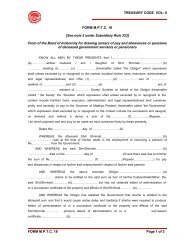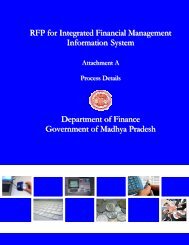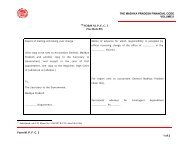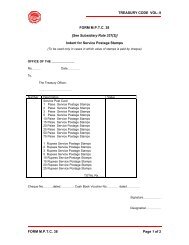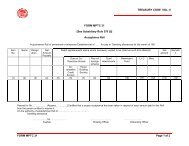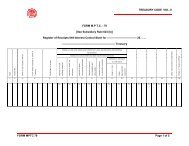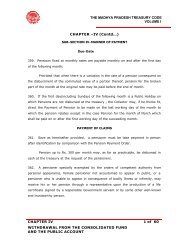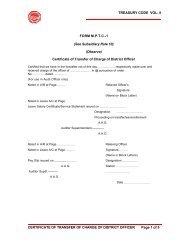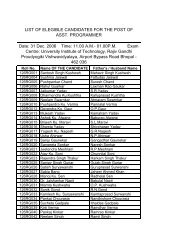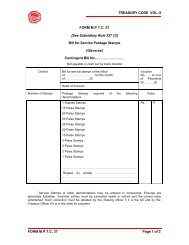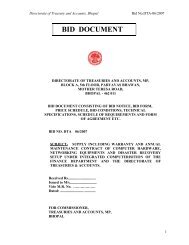THE MADHYA PRADESH TREASURY CODE ... - Mptreasury.org
THE MADHYA PRADESH TREASURY CODE ... - Mptreasury.org
THE MADHYA PRADESH TREASURY CODE ... - Mptreasury.org
You also want an ePaper? Increase the reach of your titles
YUMPU automatically turns print PDFs into web optimized ePapers that Google loves.
<strong>THE</strong> <strong>MADHYA</strong> <strong>PRADESH</strong> <strong>TREASURY</strong> <strong>CODE</strong><br />
VOLUME I<br />
INTRODUCTION<br />
(Notification No. 7435-17-R-VI(Codes), dated the 4th July, 1955,<br />
published in Madhya Pradesh Gazette, part IV(c) dated the 8th<br />
1955, under Finance Department. )<br />
July,<br />
In exercise of the powers conferred by clause (2) of Article 283 of the Constitution of<br />
India and in suppression of this department Notification No. 2455-1882-R-VI-III,<br />
dated the 29th March, 1950, the Governor of Madhya Pradesh in pleased to make<br />
the following rules, Namely:-<br />
Section I-Short title and commencement<br />
1. These Rules may be called the "Treasury Rules, Madhya Pradesh" and they<br />
shall come into force on the 1st September, 1955<br />
1 -A - If the Government consider it necessary or expedient so to do for avoiding any<br />
hardship or removing any difficulty that my arise as a result of the application of<br />
these rules, it may, subject to such restrictions and conditions, if any, as it may<br />
think fit to impose dispense with or relax the provisions of any of these rules in any<br />
case or class of cases.<br />
Section II Definitions<br />
2. In these rules, unless the context otherwise requires, the following expressions<br />
have the meaning hereby assigned to them, that is to say:-<br />
(a) " Accountant-General" means the head of the office of audit or of accounts<br />
and audit who is subordinate to the Comptroller and Auditor- General and who keeps<br />
the accounts of the State and exercises audit functions in relation to those accounts<br />
on behalf of the Comptroller and Auditor-General.<br />
(b) "The Bank" means any office or branch of the Banking Department of the<br />
Reserve Bank of India, any branch of the State Bank of India, acting as the agent<br />
of the Reserve Bank of India in accordance with the provisions of the Reserve Bank<br />
of India Act (2 of 1934) and any branch of a Subsidiary Bank as defined in Section 2<br />
of the State Bank of India (Subsidiary Banks) Act, 1959 (38 of 1959). Which is<br />
authorised to transact Government business as agent of the State Bank of India, or<br />
any other agency appointed by the Reserve Bank of India.<br />
(c) "Collector" means the Chief Officer in charge of the revenue administration of a<br />
district.<br />
Introduction 1 of 12
<strong>THE</strong> <strong>MADHYA</strong> <strong>PRADESH</strong> <strong>TREASURY</strong> <strong>CODE</strong><br />
VOLUME I<br />
(d) " Consolidated Fund of the State" means the Fund into which the revenues<br />
received by the State Government, loans raised by the Government by the issue of<br />
treasury bills, loans or ways and means advances and money received by that<br />
Government in repayment of loans are credited , and from which the expenditure of<br />
that Government , when so authorised by the State Legislature is met.<br />
(e) "The Constitution" means the Constitution of India.<br />
(f) " Indian Audit and Accounts Department" means the officers and establishment,<br />
subordinate to the Comptroller and Auditor-General, that are employed upon the<br />
audit or upon the keeping and audit of accounts of the Union and of the State, or<br />
upon one or other of these duties.<br />
(g) "Minister of Finance" means one of the Governor's Ministers to whom the<br />
business of finance is allocated by the Governor by what so ever designation such<br />
person may be called.<br />
(h) public Account of the State" means the Account into which all moneys other<br />
than those pertaining to the 'Consolidated Fund of the State' received by or on behalf<br />
of the State Government are credited, e. g. State Provident Funds, Sinking Funds,<br />
Reserve Funds, Deposits and Remittances, etc. , and from which disbursements<br />
are made in accordance with the prescribed rules.<br />
(i) "State" and "Government" means respectively the State of Madhya Pradesh and<br />
the Government of Madhya Pradesh.<br />
(i) "Treasury" means any treasury of the State and includes a sub-treasury.<br />
(k) " Bank Treasury" means a treasury the cash business of which is conducted by<br />
the Bank and a "Non-Bank Treasury" means a treasury other than a Bank Treasury.<br />
Section III- Location of money st anding in the Consolidated Fund and the<br />
public Account of the State<br />
3. Save as provided in sub-rule(2) of rule 7, moneys standing in the Consolidated<br />
fund and the Public Account of the State must either be held in the treasury or in<br />
the Bank . Moneys deposited in the Bank<br />
shall be considered as one general fund held in the books of the Bank on behalf of<br />
the State.<br />
The deposit of such moneys in the Bank shall be governed by the terms of the<br />
agreement made between the Governor of the State and the Bank under section 21<br />
of the Reserve Bank of India Act, 1934 (Act II of 1934)<br />
Note:- The agreement with the Bank is reproduced as Appendix I.<br />
Introduction 2 of 12
<strong>THE</strong> <strong>MADHYA</strong> <strong>PRADESH</strong> <strong>TREASURY</strong> <strong>CODE</strong><br />
VOLUME I<br />
Section IV- General system of control over Treasury<br />
DISTRICT TREASURIES<br />
4. (1) Unless the Government, after consultation with the Accountant-General<br />
otherwise direct in any special case, there shall be a treasury in every district. If<br />
moneys standing in the Consolidates Fund and public Account of the State are, in<br />
any district, not deposited in the Bank, the treasury of that district shall be divided<br />
into two departments; a department of accounts, under the change of an Assistant<br />
Treasury officer and a department of cash, stamps and opium, under the charge of<br />
a Treasurer.<br />
(2) The treasury shall be under the general charge of the Collector, who may entrust<br />
the immediate executive control to a Treasury Officer subordinate to him but may<br />
not divest himself of administrative control. The Collector shall be responsible for<br />
the proper observance of the procedure prescribed by or under these rules and for<br />
punctual submission of all returns required from the treasury by the Government,<br />
the Accountant-General and the Bank.<br />
Subject to the provisions of this rule, the respective responsibilities of the Collector<br />
and the Treasury Officer for business of the treasury shall be such as may be defined<br />
in accordance with such rules as the Minister of Finance may approve, after<br />
consultation with the Accountant-General.<br />
(3) The duty of verifying and certifying the monthly cash balance, if any, in the<br />
treasury in such manner as the Minister of Finance after consultation with the<br />
Accountant-General may prescribe and of submitting the monthly accounts of such<br />
balance in such form and after such verification as the Accountant-General may<br />
require shall be undertaken by the Collector or by such other officer as the<br />
Government may specify. It must be performed by the Collector in person at least<br />
once in every period of six months.<br />
(4) When a new Collector is appointed to a district, he shall at once report his<br />
appointment to the Accountant-General and shall certify to the Accountant-General<br />
the amount of the cash balance and stamp (including Match Excise Banderols) an<br />
opium stores, if any, which he has taken over. The certificate shall be submitted in<br />
such form and after such verification as the Minister of Finance may, after<br />
consultation with the Accountant-General, prescribe.<br />
(5) No portion of the responsibility for the proper management and working of<br />
treasuries shall devolve upon the officers of the Indian and Accounts Department.<br />
The inspection of treasuries by officers of the Indian Audit and Accounts Department<br />
shall not relieve the Collector of his responsibilities for management and inspection.<br />
SUB- TREASURIES<br />
5. If the requirements of the public business make necessary, the establishment of<br />
one or more sub-treasuries under a district treasury, the arrangements for the<br />
administration thereof the proper conduct of business therein shall be such as may<br />
Introduction 3 of 12
<strong>THE</strong> <strong>MADHYA</strong> <strong>PRADESH</strong> <strong>TREASURY</strong> <strong>CODE</strong><br />
VOLUME I<br />
be prescribed by the Minister of Finance after consultation with the Accountant-<br />
General.<br />
The daily accounts of receipts and payments of moneys at a sub-treasury must<br />
be included in the accounts of the district treasury.<br />
OFFICE OF <strong>THE</strong> ACCOUNTANT-GENERAL<br />
6. The office of Accountant-General may with the consent of and subject to such<br />
conditions as may be prescribed by the Comptroller and Auditor General, perform all<br />
or any prescribed part of the duties of a treasury in respect of claims against the<br />
Government that may fall due for disbursement and moneys that may be tendered<br />
for credit to the Consolidated Fund and Public Account of the State.<br />
Section V- Payment of money into the Consolidated<br />
Account of the State.<br />
Fund and public<br />
7. (1) Save as hereinafter provided in this section all moneys received by or<br />
tendered to Government servants on account of the Consolidated Fund and public<br />
Account of the State, shall with out undue delay be paid in full into the treasury or<br />
into the bank and shall be included into the Consolidated Fund and public Account of<br />
the State. Moneys received as aforesaid shall not be appropriated to meet<br />
departmental expenditure, nor otherwise kept apart from the Consolidated fund and<br />
public Account of the State. No department of the Government may require that any<br />
moneys received by it as aforesaid be kept out of the Consolidated Fund and Public<br />
Account of the state.<br />
(2) Notwithstanding anything contained in sub-rule(1) of this rule direct<br />
appropriation of departmental receipts for departmental expenditure is authorised in<br />
the following cases, that is to say:-<br />
(a) in the case of moneys received on account of the service of summonses, dietmoney<br />
of witnesses and similar purposes in civil, revenue and criminal cases;<br />
(b) in the case of deposits received at a Civil Court and utilised by the Court to<br />
meet claims for the refund of such deposits;<br />
(c) in the case of fees received by Government servants appointed Notaries public,<br />
under Act (LIII of 1952), and utilised to defray legal expenses, incurred by them in<br />
the discharge of their duties as such Notaries public;<br />
(d) in the case of cash receipts utilised in accordance with departmental<br />
regulations by the public Works Department to defray expenditure on current works,<br />
or utilised by that department under the authorisation of the Accountant-General to<br />
defray pay and travelling allowance charges;<br />
(e) in the case of cash found on the persons of prisoners at the time of their<br />
admission to jail, and used for the repayment by Jail Superintendents under<br />
departmental regulations of similar sums due to other prisoners on their release;<br />
Introduction 4 of 12
<strong>THE</strong> <strong>MADHYA</strong> <strong>PRADESH</strong> <strong>TREASURY</strong> <strong>CODE</strong><br />
VOLUME I<br />
(f) in the case of cash received by the Forest Department and utilised in meeting<br />
immediate local expenditure;<br />
(g) in the case of collections in Government hospitals and utilised for making<br />
refunds, if any to patients leaving the hospitals;<br />
(h) in the case of Courts allowed to make refunds out of money received by them<br />
as fines;<br />
(i) in cases covered by the rules in other authorized Codes:<br />
Provided that the authority hereby given to appropriate departmental receipts<br />
for departmental expenditure shall not be construed to keep the departmental<br />
receipts and expenses defrayed therefrom outside the account of the payments into<br />
and the withdrawals from the Consolidated Fund and Public Account of the State.<br />
8. Moneys received by or deposited with---<br />
(a) any officer employed in connection with the affairs of the State in his capacity as<br />
such, other than revenues or public moneys raised or received by the State<br />
Government, or<br />
(b) any Court within the State to the credit of any cause, matter, account or<br />
persons, shall be paid into the public Account of the State. If any question arises<br />
whether moneys are or are not moneys relating to or forming part of the Public<br />
Account of the State, the question shall be referred to Government whose decision<br />
shall be final.<br />
9. (1) A Government servant may not, except with the special permission of the<br />
Government, deposit in a bank moneys withdrawn from the Consolidated Fund and<br />
Public Account of the State under the provision of Section VII of these rules.<br />
(2) With the permission of the Governor, his Private or Military Secretary may open<br />
an account in a bank for the deposit of funds under the personal control of the<br />
Governor.<br />
10. The procedure to be adopted by Government servants in receiving moneys on<br />
account of the Consolidated Fund and Public Account of the State, granting receipts<br />
for such moneys and paying them into the aforesaid accounts and by the treasury<br />
and the Bank in receiving such moneys and granting receipts for them shall be such<br />
as may be prescribed by the Minister of Finance after consultation with the<br />
Accountant-General. The procedure so prescribed shall among other matters,<br />
contain provisions so as to secure that--<br />
(1) any person paying money into the treasury shall present with it a memorandum<br />
(chalan) in such form, as may be prescribed, which will show clearly the-nature of<br />
the payment and the person or Government servant on whose account it is made<br />
and will thus contain all the information necessary for the preparation of the receipt<br />
Introduction 5 of 12
<strong>THE</strong> <strong>MADHYA</strong> <strong>PRADESH</strong> <strong>TREASURY</strong> <strong>CODE</strong><br />
VOLUME I<br />
to be given in exchange and for the proper accounts classification of the credit and<br />
its allocation between Governments and departments concerned;<br />
(2) at places where the money is to be deposited in the Bank, the memorandum or<br />
chalan referred to in clause(i) above, shall except where otherwise provided be<br />
presented directly to Bank with money which will receive it and grant a receipt;<br />
(3) if a cheque on a bank is accepted in payment of Government dues under any<br />
rules, a receipt for the actual cheque only shall be given, but the formal receipt for<br />
payment shall not be delivered until the cheque has been accepted by the Bank on<br />
which it is drawn; and<br />
(4) at places where the money is to be deposited in the bank the advices of receipts,<br />
which according to any provision made under this rule have to be sent to public<br />
officers or departments and consolidated receipts or certificates of receipts required<br />
by any such provision to be given to any public officer or department, shall be given<br />
by the treasury and not by the Bank.<br />
Section VI- Custody of moneys relating to or standing in the Consolidated<br />
Fund and Public Account of the State.<br />
11. (1) The procedure for the safe custody of moneys in the hands of Government<br />
servants, or held in a treasury, shall be as prescribed by the Minister of Finance,<br />
after consultation with the Accountant-General.<br />
(2) The Bank is responsible for the safe custody of Government moneys<br />
deposited in the Bank.<br />
Section VII- Withdrawal of moneys from the Consolidated fund and public<br />
Account of the State.<br />
12. In this section" Withdrawal" with its cognate expressions refers to the<br />
withdrawal of funds from the Consolidated Fund and Public Account of the State, for<br />
disbursements of or on behalf of the State other than, disbursements in the United<br />
Kingdom.<br />
13. Unless the Minister of Finance, after consultation with the Accountant-General,<br />
otherwise directs in any case, moneys may not be withdrawn from the consolidated<br />
Fund and Public Account of the State without the written permission of the Treasury<br />
Officer or of an officer of the Indian Audit and Accounts Department authorized in<br />
this behalf by the Accountant-General.<br />
14. The Accountant-General may permit withdrawal for any purpose with in the<br />
limit of his own jurisdiction. Unless expressly authorized by these rules or by any<br />
special orders of the Government, the Accountant-General may not permit<br />
withdrawal at a place outside the limits of his own jurisdiction.<br />
15. (a) Subject as hereinafter provide in this section a Treasury Officer may permit<br />
withdrawal for all or any of the following purposes, namely:-<br />
(i) To pay sums due from the Government to the drawing officer,<br />
Introduction 6 of 12
<strong>THE</strong> <strong>MADHYA</strong> <strong>PRADESH</strong> <strong>TREASURY</strong> <strong>CODE</strong><br />
VOLUME I<br />
(ii) To provide the drawing officer with funds to meet claims likely to be<br />
presented against the Government in the immediate future by----<br />
(1) other Government servants, or<br />
(2) private parties.<br />
(iii) To enable the drawing officer to supply funds to another Government<br />
servant from which to meet similar claims<br />
(iv) To pay direct from the treasury or from the Bank sums due by<br />
Government to a private party.<br />
(v) In the case of an officer or authority empowered to make investments of moneys<br />
standing in the Consolidated Fund and the Public Account of the State, for the<br />
purpose of such investment.<br />
(vi) To pay sums to the drawing officer on account of permanent Advance<br />
sanctioned to his office.<br />
(b) Unless expressly authorized by the Accountant-General, a Treasury Officer shall<br />
not permit withdrawal for any purpose not specified in clause(a) of this rule.<br />
(c) A Treasury Officer shall not permit the first drawal by a drawing officer of a newly<br />
created officer or an office created by bifurcation of an existing office, unless a<br />
declaration from the Government nominating/authorising the Head of the office<br />
issued by the Government, is received in audit and an authority is received by the<br />
Treasury Officer from the Accountant-General, placing the new drawing officer in<br />
account with the treasury. First payment shall be made after specimen signatures<br />
are received, in the manner laid down in S. R. 157 of the M. P. T. C. Volume-I.<br />
16. Except as provided in rules 26 and 27, a Treasury Officer shall not permit<br />
withdrawal for any purpose unless the claim for withdrawal is presented by such<br />
person and in such form, and has been satisfactorily submitted by the Treasury<br />
Officer to such checks, as the Minister of Finance, after consultation with the<br />
Accountant-General, may prescribe. The procedure so prescribed shall, among<br />
other matters, contain provisions so as to secure---<br />
(i) that any person having a claim against Government shall present his voucher at<br />
the treasury duly receipted, and stamped where necessary, and that unless<br />
otherwise specially provided no such claim shall be paid unless the claim is first<br />
submitted to, and the payment directed by, the Treasury Officer;<br />
(ii) that where sub-treasuries are specially permitted by the Government to cash<br />
certain classes of bills without reference to the Treasury Officer , the payment of<br />
such bills shall not, except under special arrangements and on particular occasions,<br />
be allowed at the district treasury also;<br />
(iii) that all bills and vouchers on which payment is made by the Treasury Officer or<br />
which are enforced by him for payment at the Bank or a sub-treasury shall show to<br />
what head of account the payment is to be debited, how the amount of the payment<br />
Introduction 7 of 12
<strong>THE</strong> <strong>MADHYA</strong> <strong>PRADESH</strong> <strong>TREASURY</strong> <strong>CODE</strong><br />
VOLUME I<br />
is to be allocated between Governments or departments, and what amount, if any,<br />
appertains to other Governments.<br />
17. A Treasury Officer has no general authority to make payments on demands<br />
presented at the treasury, his authority being strictly limited to the making of<br />
payments authorized by or under these rules. If a demand of any kind is presented<br />
at a treasury for a payment which is not authorized by or under these rules, or is<br />
not covered by a special order received from the A ccountant-General, the Treasury<br />
Officer shall decline payment for want of authority. A Treasury Officer has no<br />
authority to act under an order of Government sanctioning a payment; unless the<br />
order is an express order to him to make the payment; and even such special orders<br />
should, in the absence of urgency, be sent through the Accountant-General.<br />
18. A Treasury Officer shall not honour a claim which he considers so be disputable.<br />
He shall require the claimant to refer it to the Accountant-General.<br />
1 9. Expect as provided by rules 20 and 21 a payment shall, unless Government by<br />
general or special order otherwise direct be made in the district in which the claim<br />
arises.<br />
20. The leave salary of a gazetted Government servant who draws his leave salary<br />
in India may be paid in any district of the State and the leave salary of a nongazetted<br />
Government servant may be drawn from that treasury or office of<br />
disbursement only from which his pay could be drawn if he were on duty. In the<br />
latter case, the Government Servant must make his own arrangement where<br />
necessary, for getting his leave salary remitted to him.<br />
21. Pensions payable in India may be paid in any district of the State.<br />
22. No withdrawal shall be permitted in order to meet the pay, leave salary or<br />
allowances of a gazetted Government servant or a reward or honorarium payable to<br />
gazetted Government servant, or any pensions until the Accountant-General has<br />
intimated to the Treasury Officer the rate at which payment shall be made; provided<br />
that the Government may, for special reasons and with the concurrence of the<br />
Accountant-General, waive the provisions of this rule.<br />
Note:- In the following cases, the Government, in consultation with the Accountant-<br />
General, Madhya Pradesh, have waived the substantive provision of the rule<br />
and consequently no authority of the Accountant-General for permitting the<br />
withdrawal of funds in such cases is necessary:-<br />
(a) For payment of honorarium to a gazetted Government servant by the<br />
Editor " Sainik Samachar" for contributing articles, etc:<br />
(b) For payment to be made under the scheme for the withdrawal of pay and<br />
allowances etc. , of gazetted Government servants by Heads of<br />
offices, in Establishment bill forms;<br />
(c) For payment of pay and allowances by Indian Embassy etc. , to a<br />
gazetted Government servant sent on deputation abroad for a period<br />
Introduction 8 of 12
<strong>THE</strong> <strong>MADHYA</strong> <strong>PRADESH</strong> <strong>TREASURY</strong> <strong>CODE</strong><br />
VOLUME I<br />
not exceeding two months in cases where the sanction itself is<br />
regarded as an authority for making the payment;<br />
(d) for payment of honorarium to a gazetted Government servant by the<br />
Public Service Commission;<br />
(e) for payment of honorarium of an occasional nature upto Rs. 100 by a<br />
Head of Office to a Gazetted Government servant.<br />
23. No withdrawal shall be permitted on a claim for the first of any series of<br />
payment in a district, of pay or allowance to a Government servant other than a<br />
person newly appointed to Government service, unless the claim is supported by a<br />
last pay certificate in such form as may be prescribed by the Comptroller and<br />
Auditor-General. A Treasury Officer may not permit any withdrawal in respect of pay<br />
or allowances of a Government servant to whom he has granted a last pay<br />
certificate, unless the certificate is first surrendered.<br />
Note:- Withdrawal for a claim for travelling allowance in respect of journey by a<br />
retiring All-India Service Officer and his family, from his last place of duty to<br />
a place where he wishes to reside, may be permitted by a Treasury Officer<br />
even without surrendering the Last Pay Certificate.<br />
23-A Unless the Government specially direct otherwise in any case, a Treasury<br />
Officer shall not make payment on account of the Government's investments in a<br />
Company, Corporation or similar autonomous <strong>org</strong>anisations except on the authority<br />
of the Accountant-General, Madhya Pradesh. This condition will however, not apply<br />
in the case of investments in the form of share capital of or loans to any co-operative<br />
society registered under M. P. Co-operative Societies Act.<br />
24. The Treasury Officer shall be responsible to the Accountant-General for<br />
acceptance of the validity of a claim against which he has permitted withdrawal, and<br />
for evidence that the payee has actually received the sum withdrawn.<br />
25. A Treasury Officer shall obtain sufficient information as to the nature of every<br />
payment, he is making and shall not accept a claim which does not formally present<br />
that information unless there are valid reasons, which he shall record in writing for<br />
omitting to require it.<br />
26. A Treasury Officer may correct an arithmetical inaccuracy or an obvious mistake<br />
in any bill presented to him for payment, but shall intimate to the drawing officer<br />
any correction which he makes.<br />
27. A Collector may, in circumstances of urgency, by an order in writing authorise<br />
and require a Treasury O fficer to make a payment, not being a payment of pension,<br />
without complying with the provisions of these rules. In any such case the Collector<br />
shall at once forward a copy of his order and a statement of the circumstances<br />
requiring it, and the Treasury Officer shall at once report the payment, to the<br />
Accountant-General.<br />
Note:-- The need for exercising the special power under this rule, should not arise<br />
at all in normal conditions. The power should be used only in real cases of<br />
Introduction 9 of 12
<strong>THE</strong> <strong>MADHYA</strong> <strong>PRADESH</strong> <strong>TREASURY</strong> <strong>CODE</strong><br />
VOLUME I<br />
urgency, e. g. floods, earthquake and the like, and withdrawals of money<br />
under this rule should, as far as possible, exclude all personal claims of<br />
Government servants.<br />
28. A Government servant who is authorized to draw moneys by means of cheques<br />
shall notify to the Bank or the treasury upon which he draws, the number of each<br />
cheque book brought into use and the number of cheques it contains.<br />
29. When a Government servant who is authorized to draw or countersign cheque or<br />
bill payable at the treasury or the Bank makes over charge of his office to another ,<br />
he shall send a specimen of the relieving Government servant's signature to the<br />
Treasury Officer or to the Bank , as the case may be.<br />
SectionVIII- Transfer of moneys standing in the Consolidated Fund and<br />
public Account of the State.<br />
30. The transfer of Government moneys from one treasury to another and between<br />
the currency chest balance and treasury balance of a treasury and between a<br />
treasury and the Bank shall be governed by such instructions as may be issued in<br />
this behalf by the Minister of Finance after consultation with the Reserve Bank of<br />
India. The transfer of moneys from or to a small coin depot to or from a treasury<br />
under the control of the Government of the State shall be governed by instructions<br />
issued by the Central Government in this behalf.<br />
Section IX- Responsibility for money withdrawn<br />
31. If a Treasury Officer receives intimation from Accountant-General that moneys<br />
have been incorrectly withdrawn and that a certain sum should be recovered from a<br />
drawing officer, he shall effect the recovery without delay and without regard to<br />
any correspondence undertaken or contemplated with reference to the retrenchment<br />
order; and the drawing officer shall without delay repay the sum in such manner as<br />
the Accountant-General may direct.<br />
32. (a) Subject as hereinafter provided in this rule, the procedure to be observed<br />
by a Government servant in regard to moneys withdrawn from the Consolidated<br />
Fund and Public Account of the State for expenditure shall be such as may be<br />
prescribed by the Minister of Finance after consultation with the Accountant-General.<br />
(b) A Government servant supplied with funds for expenditure shall be<br />
responsible for such funds until an account of them has been rendered to the<br />
satisfaction of the Accountant-General. He shall also be responsible for seeing that<br />
payments are made to persons entitled to receive them.<br />
(c) If any doubt arises as to the identity of the Government by whom an<br />
account of such funds shall be rendered, it shall be decided by Government.<br />
Section X- Inter Government transaction<br />
33. (1) Save as provided hereafter in this section no transactions of the State with<br />
another Government shall be adjusted against the balance of the State except in<br />
accordance with such directions as may be given by the Comptroller and Auditor-<br />
Introduction 10 of 12
<strong>THE</strong> <strong>MADHYA</strong> <strong>PRADESH</strong> <strong>TREASURY</strong> <strong>CODE</strong><br />
VOLUME I<br />
General with the approval of the Central Government to regulate the procedure for<br />
the accounting of transactions between different Governments.<br />
(2) Moneys presented within the jurisdiction of another Government for credit to<br />
the Consolidated Fund and Public Account of the State or a payment made by<br />
another Government as a withdrawal affecting the balances of the Consolidated Fund<br />
and Public Account of the State shall not be credited or debited to the Consolidated<br />
Fund and Public Account of the State except under express authority of the<br />
Accountant-General or any other Accounting Officer authorized in this behalf by the<br />
Comptroller and Auditor-General.<br />
(3) All adjustments against the balance of the State by debit or credit to another<br />
Government shall be made through the Central Accounts Office of the Reserve Bank<br />
of India.<br />
34. Where such a course is authorized in consequence of a delegation of functions<br />
made under sub-section(1) of Article 258 of the Constitution the Treasury Officer<br />
may receive or authorize the Bank to receive moneys tendered on behalf of the<br />
Central Government, and may make or authorize the Bank to make disbursements<br />
on behalf of the Central Government in accordance with such procedure as may be<br />
specified in the rules made by or under the authority of the president. Such receipts<br />
and disbursements on behalf of the Central Government shall be adjusted, as far as<br />
practicable, directly against the balance of the Central Government held by the<br />
Bank, but where such transactions are temporarily taken into account against the<br />
balance of the Consolidated Fund of the State or the public Account of the State, as<br />
the case may be, the Accountant-General will on receipt of intimation from the<br />
treasury make the requisite adjustments in respect of the aforesaid transactions<br />
through the Central Accounts Office of the Reserve Bank of India, against the<br />
balances in the Consolidated Fund or the Public Account of India held by the Bank.<br />
35. The Treasury Officer may, subject to any general or specific direction of the<br />
Government in this behalf, receive or authorise the Bank to receive moneys<br />
tendered on behalf of another State and may, if so required by the Accountant-<br />
General, make or authorize payment of any claim against another State. The<br />
necessary credits or debits in respect of such receipts and payments against the<br />
balance of the State concerned shall be made by the Accountant-General through the<br />
C entral Accounts Office of the Reserve Bank of India, but until such adjustments are<br />
made the credits and debits shall be entered in the Consolidated Fund and Public<br />
Account of the State, as the case may be.<br />
Moneys paid or received in the office of the Accountant-General on behalf of<br />
another State and book entries made in the office of the Accountant-General<br />
affecting the accounts of another State shall likewise be adjusted by the Accountant-<br />
General through the General Accounts Office of the Reserve Bank of India against<br />
the balances of the State concerned.<br />
Section XI- Receipts and disbursements of the State in the United Kingdom.<br />
36. Moneys received in the United Kingdom on account of the Consolidated Fund<br />
of the State may be paid into, and funds required for disbursements of or on behalf<br />
of the State in that country may be withdrawn from the balances of the Consolidated<br />
Introduction 11 of 12
<strong>THE</strong> <strong>MADHYA</strong> <strong>PRADESH</strong> <strong>TREASURY</strong> <strong>CODE</strong><br />
VOLUME I<br />
Fund of India in that country, in accordance with such procedure as may be<br />
prescribed for the transactions of the Central Government in the United Kingdom.<br />
These transactions shall be adjusted in India, at the earliest opportunity, against<br />
the balances of the Consolidated Fund of the State according to such directions as<br />
may be given in this behalf by the Comptroller and Auditor-General of India with the<br />
approval of the president.<br />
Section XII- Supplemental<br />
37. The Accountant-General in the exercise of any of this functions under these<br />
rules shall be subject to the general control of the Comptroller and Auditor-General<br />
of India.<br />
38. Nothing in these rules, and nothing prescribed under these rules shall have<br />
effect so as to impede or prejudice the exercise by the Comptroller and Auditor-<br />
General of India of the powers vested in him by or under the constitution, to make<br />
rules or to give directions regulating the submission to the Indian Audit and Accounts<br />
Department of the accounts kept in treasuries or in departmental offices and to be<br />
accompanied by such vouchers for their support as the Comptroller and Auditor-<br />
General may require for purpose of audit.<br />
39 The Minister of Finance may not exercise any power conferred upon him by these<br />
rules so as impose upon the Bank in connection with the business of the Government<br />
any responsibility not imposed upon the Bank by the terms of its agreement with the<br />
Governor.<br />
Introduction 12 of 12


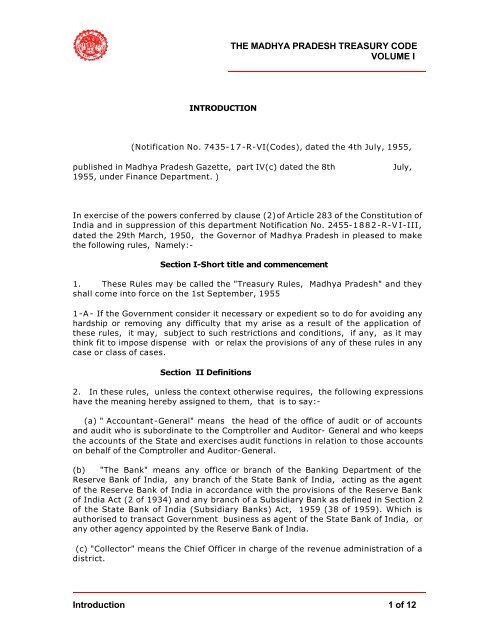
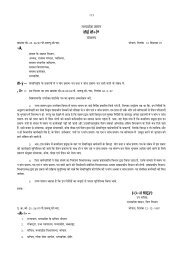
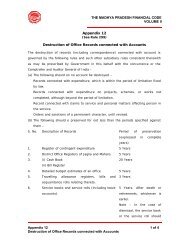
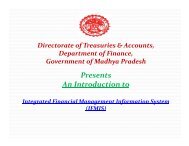
![Form M.P.F.C. 20 [See Rule 266 (4)] - Mptreasury.org](https://img.yumpu.com/50367893/1/190x146/form-mpfc-20-see-rule-266-4-mptreasuryorg.jpg?quality=85)
